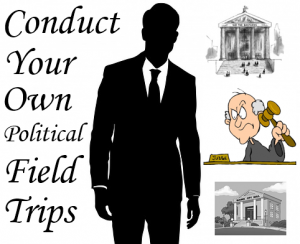Political Field Trips: A Tutorial on How to Experience Government Directly
Download this spoken discourse. (MP3) – Download a PDF version of this article.
By: Kyle Rearden [social title=”” subtitle=”” link=”thelastbastille.wordpress.com” icon=”fa-bitcoin”]
October 14th, 2015
“Government is essentially the negation of liberty. It is the recourse to violence or threat of violence in order to make all people obey the orders of the government, whether they like it or not. As far as the government’s jurisdiction extends, there is coercion, not freedom… [b]ut the fact remains that government is repression not freedom. Freedom is to be found only in the sphere in which government does not interfere. Liberty is always freedom from the government.” [Emphasis added]
– Ludwig von Mises, Part V, Liberty & Property (1958)
 Transparency and reformism are an odd couple. “Involvement” in “local” government usually entails a watchdog function alongside a combination of grassroots lobbying, electoral voting, and running for public office. While the desire for transparency is good for the purpose of open-source intelligence gathering, the wishful thinking inherent in reformism is irredeemably bad.
Transparency and reformism are an odd couple. “Involvement” in “local” government usually entails a watchdog function alongside a combination of grassroots lobbying, electoral voting, and running for public office. While the desire for transparency is good for the purpose of open-source intelligence gathering, the wishful thinking inherent in reformism is irredeemably bad.
Political field trips are a way of attending public meetings (and other similar governmental functions) whereby an individual directly experiences the daily routine of government within its own natural habitat, under normal circumstances. These educational field trips are conducted in groups of three known as circuits; each of these circuits are focused on only one level of government, usually either the municipal or county government. During the course of a circuit, each political fieldtrip shows a different element of government in action – a legislature, a judiciary, and a private reformist organization, typically either a political party or a grassroots lobby.
For many years, I have frequently attended a variety of public meetings where I have witnessed the machinery of government hurting people, but I neglected to document it at the time since my goal back then was just to simply learn the inevitable consequences of Leviathan’s absolute power. It wasn’t until I entered into the alternative media that I realized what I had learned about government, as a pragmatic witness, ought to not only be publicly exposed, but also clearly emulated by others. In this spirit, I have written a series of political field trip reports in order to give readers a taste of what I have directly experienced myself. A listed bibliography is as follows:
- Austin City Council Meeting (9/27/12)
- Austin Municipal Court Docket Session (10/5/15)
- Texans for “Accountable” Government Meeting (9/28/15)
- Williamson County Commissioner’s “Court” Meeting (9/29/15)
- Williamson County Court Docket Session (10/6/15)
- Williamson County “Libertarian” Party Chapter Meeting (10/12/15)
As you can no doubt tell, I went on two different circuits – one for the Austin municipal government, and the other being the Williamson county government. I considered going on a Texas (provincial?) government circuit, but the next regular session of the Texas legislature won’t occur until January 10th of 2017. So, what I ended up doing was visiting the legislative, judicial, and reformist organizations for Austin’s municipal and Williamson’s county governments each; however, I suggest that you may just want to go on only one circuit, preferably county government, because all things considered, that is probably the level of government that is the easiest for you to attend, with a minimum of American police state fussiness.
Likely by this point, you are curious as to why should anyone bother going on a political field trip, much less a circuit (or two) of them? Political field trips are good because of their tactile educational value. Since they do not promote floating abstractions of what government should or should not be, but rather, they provide a way to be an eyewitness to the coercive human action of “government,” political field trips satisfy a market demand for people to truly understand the anatomy of the State without having to read a copious number of books, which usually limit themselves to descriptions of mere theory, anyway. Simply put, the technique of political field trips attempts to double-check praxeological conclusions about statism through inductive reasoning, which is based upon empirical observations (in this context) of governmental functions.
Interestingly enough, political field trips could also serve as a version on a theme of a litmus test for those considering, or even advocating for, human liberty. By gauging one’s sincerity for freedom through direct experience of Leviathan, an individual can be fairly judged as to their intentions for restoring and securing American liberty, especially if they happen to initially favor reformism and partyarchy. Obviously, I am hedging my bets that individuals who embark on political field trips will, more often than not, choose to turn away from Leviathan, although this is certainly not a guarantee by any means, since it is arguable that it is “equally” possible for someone to become “inspired” by government, thereby becoming a real-life version of Leslie Knope.
Preparation for undergoing a political field trip circuit entails becoming familiar not only with whatever entity is about to be visited, but also with the expected standards of behavior. Generally speaking, it is preferable to dress more conservatively than not (especially with the judiciary), and to refrain from needlessly fraternizing with either the government employees or other attendees (although, to be fair, it is nearly impossible to completely avoid small talk when at a reformist organization’s meeting, so just consider this as more of a guideline than a “hard and fast” behavioral rule). The idea here is to blend into the surrounding background of the social atmosphere without drawing attention to yourself; keep your eyes and ears wide open, and your mouth firmly shut, as much as possible!
Traveling towards your destination should be considered when planning how to conduct your own political field trips. The financial costs of going on a circuit are marginal, yet the opportunity costs are lower over the long-term, by which I mean that the marginal utility of “gas money” for political field trips vis-à-vis the vast accumulation of political literature may or may not be cheaper for your pocketbook overall, but directly experiencing government, sooner rather than later, will likely encourage you to dismiss any reformist strategy, therefore having you avoid serious heartache over the long haul. For example, paying up $5 for parking, or traveling 40 miles roundtrip, during one or two political field trips now might just save you years worth of “gas money” later that would’ve otherwise been spent going on the equivalent of a cross-country road trip in order to ineffectively “reform” government.
When actually traveling, make sure to depart with enough “get lost” time, especially if you are unfamiliar with the area the political field trip is supposed to occur. Check local maps and determine alternate routes, just in case your chosen primary route turns out to have significant time-delaying problems, like construction detours or nasty rush hour traffic. The availability of parking will be largely determined by the population density your political field trip circuit takes place in; generally speaking, urban downtown and “inner city” areas are the worst for parking due to bad design and sheer lack of space, whereas in gentrified suburban and “small town” rural areas, this is rarely a problem at all.
Security procedures that might be encountered during a political field trip must be anticipated before you arrive. Generally speaking, judicial courthouses have the strictest security screenings, legislative buildings tend to have moderate security, and reformist organizations are well-known for their sheer lack of security. If you expect security, you must leave your knives, firearms, and multi-tools behind, either back at home or in your car. You will have your bags and the contents of your pockets X-rayed, and you will walk through the metal detector; if it beeps, STOP and look straight into the eyes of the nearest government employee, and follow their orders promptly, even if that includes getting wanded or padded down. I say this because, seldom otherwise, you must abide by the conditions of entry into a government facility, which usually includes warrantless searches; my recommendations to you are intended to reduce the likelihood that you will become unjustly profiled.
During the course of a political field trip, pay close attention to the behavior of everyone else. Notice how the government agents treat each other, how they treat the attending citizenry, as well as how members of the public react to the government agents. These clues are crucial for you to notice in order for you to make a determination as to whether or not “government” is acting in a beneficent manner, or not.
What you also want to look for are oddities and irregularities, especially in their procedures. Whether these government employees are contradicting their own rules of court, statutory laws, or even constitutions, it is still worth noting if they expect you to obey their various rules, laws, and constitutions, regardless of their “official” conduct. Also, make note of their ceremonial worshiping of the State, and if any, to what degree they expect you to comply with their whole dog-and-pony show.
While you are attending a political field trip, try and discern what your own emotional feelings are about what you are witnessing happens to be; usually, I don’t emphasize such things, however, I find that the sheer “ick” factor experienced by those on political field trips tend to be more illustrative than not about the nature of government when directly experienced. For instance, do you feel like you belong? Are you in agreement with what is transpiring before your very eyes? Are you excited, bored, horrified, or pleased? Overall, do you like government more or less at the conclusion of a political field trip?
Financial transparency can illuminate just how much all this government is costing the poor sap taxpayers, even if you decide supporting Leviathan more than you did before you embarked on your political field trip circuit. How much is all this government actually costing you and all the other taxpayers? Ask yourself if these coercive government monopolies are really worth it in terms of maintaining “law and order,” once you’ve examined their Comprehensive Annual Financial Reports.
Should you decide that from what you witnessed during your political field trip circuit that the State is irredeemably evil, then I would encourage you to seriously consider cancelling your voter registration. If you are uncomfortable with giving up the political process in this democratically socialist banana republic just yet, then I would suggest instead that you engage in “last-ditch reformism” by printing out three copies of the Under One Banner petition, signing them with your legal name, and then either hand-delivering or snail-mailing them to “your” federal congresscritters, if for no other reason than to learn just how much they care about your grievances. Regardless of your decision path, I’d hope you’d choose to eventually take the next step and partake in the market selection of anti-political activities composing freedom umbrella. In other words, I envision your decision paths to be either:
- Path #1: political field trips > cancellation of voter registration > freedom umbrella
- Path #2: political field trips > Under One Banner petition > cancellation of voter registration > freedom umbrella
I sincerely think that either of these paths will save you a lot of grief, because they are efficient for the purpose of encouraging you to move along the other (not so) thin line more quickly by taking up the economic means of making money, as Albert Jay Nock put it.
In conclusion, if the Austrian economists have taught humanity anything, it’s that due to their subjective theory of value, what is good for you is not necessarily good for all (or maybe even most). Previous experience has demonstrated that people begin caring about human liberty once they have witnessed something happening to someone they personally know, something that occurs right in front of them, or something that happened directly to themselves. Therefore, political field trips attempt to fill this market demand for experiencing government directly, sans the immediacy of a grievance being used against you, personally. If there were a theme song whose lyrics accurately capture the spirit of political field trips, it would be No Resolve’s Get Me Out.



Trackbacks/Pingbacks